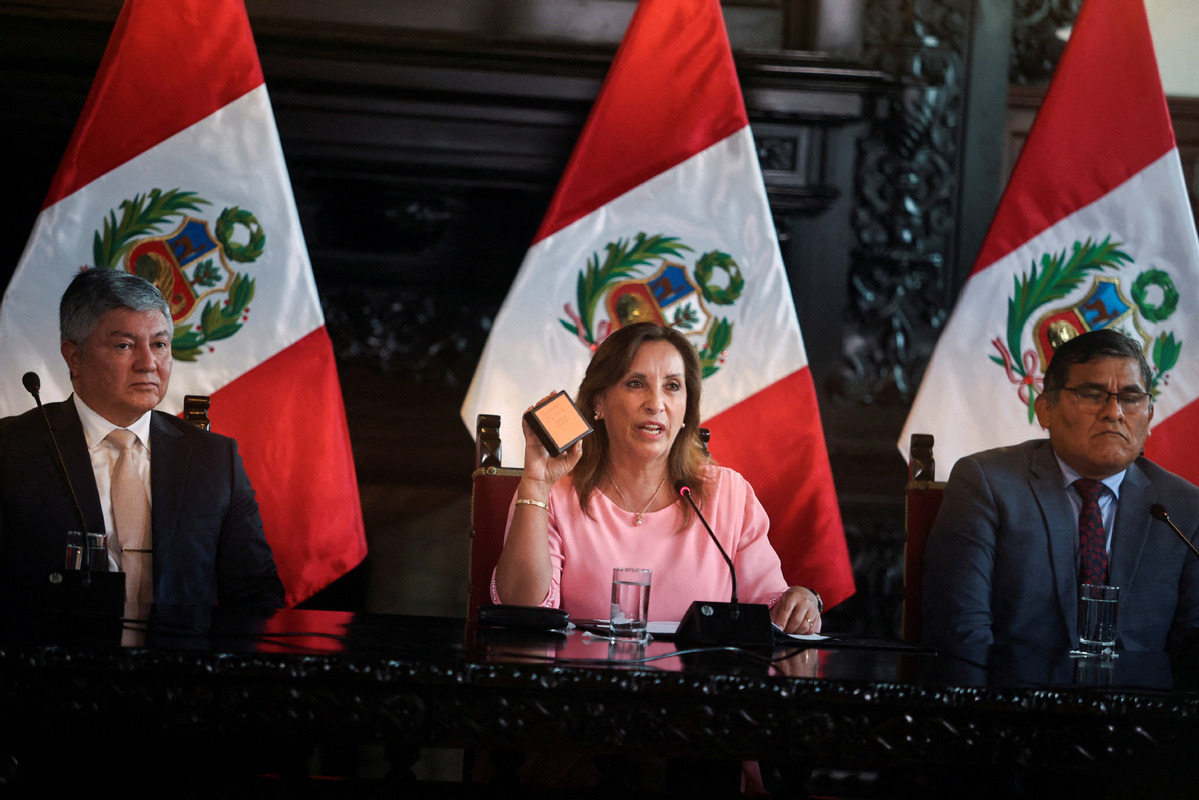Peru's president Boluarte seeks to move past use of Rolex watches
By JIMENA ESTEBAN in Buenos Aires, Argentina | chinadaily.com.cn | Updated: 2024-04-10 15:10

Peru's President Dina Boluarte is working to move past the latest political stir that has rocked the country, although the impact of so-called "Rolexgate" may prolong for some time.
Over the weekend, she dismissed the investigations into her use of expensive Rolex watches as a "smoke screen" and blamed advice from others for waiting several weeks to discuss the issue. On April 4, lawmakers twice rejected motions to debate an impeachment of the president.
Peru's Constitution allows for impeachment proceedings to be launched for "moral incapacity".
In mid-March, the popular news podcast La Encerrona reported on Boluarte's use of expensive watches after analyzing some 10,000 images on social media. The expensive watches, which experts have valued at tens of thousands of dollars each, are inconsistent with a $4,200 monthly salary as president. On March 30, police raided the presidential palace and Boluarte's home, the first time such a raid was conducted at the home of a sitting president.
The most recent scandal has taken several twists and turns, in part because Boluarte has given different explanations for the watches she was seen wearing, saying that they were either old pieces she has had for a long time or loaned to her by a close friend. She said that, because the watches were a loan, she was not obliged to declare them.
Peru has had six presidents in as many years. Boluarte, 61, still faces allegations of illicit enrichment. After her use of the watches surfaced, about a third of her cabinet resigned.
Boluarte took over as president not in an election but after her predecessor Pedro Castillo was ousted in December 2022. Boluarte also faces criticism over handling of 49 deaths during protests following Castillo's ouster.
While little is known about Boluarte's assets or wealth that she might have acquired through marriage, she never disclosed any expensive watches, said Fernando Tuesta Soldevilla, a political analyst at Pontifical Catholic University of Peru. Her appearance on television and podcasts wearing the expensive watches triggered an outcry and decrease her base of support.
Boluarte's support has hovered around 15 percent since she took office but has now fallen to about 8 percent, affected by the allegations of corruption as well as the earlier crackdown on protesters, Soldevilla noted.
More opinion polls could be in the offing and her credibility could fall further, he said, pointing out that Boluarte has the lowest approval rating of any president in Latin America.
Yet, the Peruvian Congress appears to have little appetite to oust the embattled president.
"They support her because it is practical, and it is practical because if she is dismissed, they will have to move up the 2026 election, and a majority of the congressmen do not want this to happen," Soldevilla said.
Still, the scandal has again highlighted the fragility of Peruvian politics since the wide-ranging bribe investigations in 2016, said Richard Cuadros Soldevilla (no relation to Fernando Soldevilla), a political analyst at the National University of San Marcos.
"For many in the construction sector, it was an open secret that winning a bid involved having a percentage of bribes for public entities that grant authorizations," Richard Soldevilla said.
Still, those cases led to the creation of specialized law enforcement units focused on corruption in government and greater involvement by law enforcement in the country's politics.
"There's a term for this, the 'judicialization of politics', insofar as political entities are unable to respond or resolve corruption issues because many of them are involved, an external body like the judicial apparatus, responsible for the administration of justice, intervenes," said Richard Soldevilla.
The main cause is the corruption process that has occurred in Peru at the central government level, regional governments and local governments, which is a very critical problem in the country because in Peru, a country with about 70 percent of its economic activities being informal, many people regard respect for the rules as secondary or tertiary, he said.
The analyst noted an observation made by Peru's Comptroller General that the country could be losing more than $6 billion annually to corruption, equivalent to about 14 percent of the national budget.
The writer is a freelance journalist for China Daily.
























